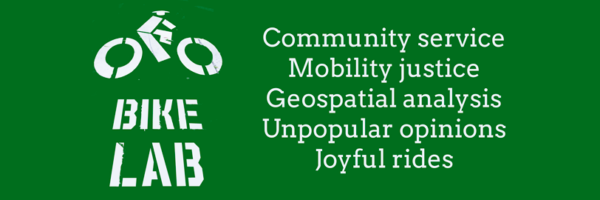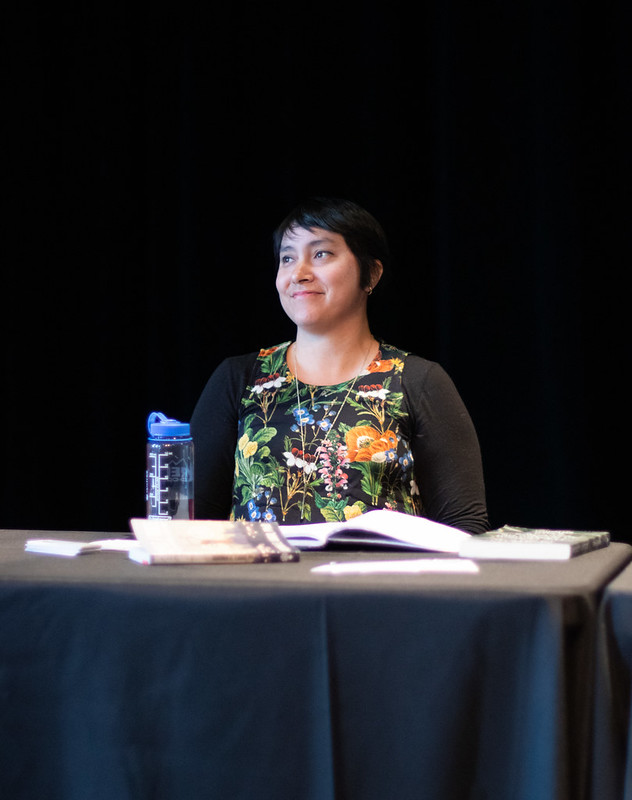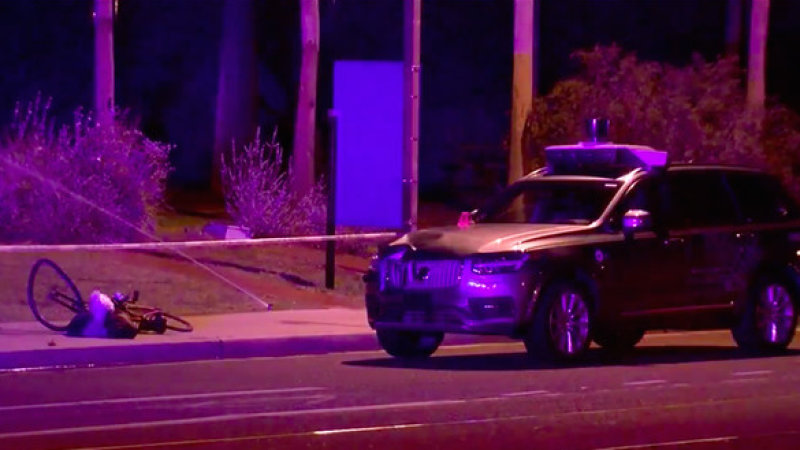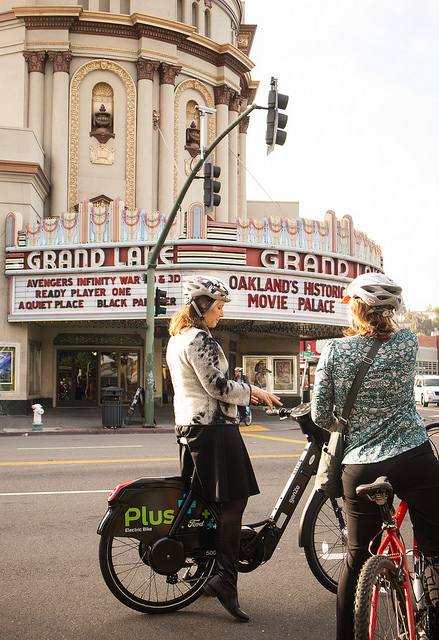I’d been looking forward to this day for six months, since Adonia Lugo had to cancel her talk at Rich City Rides in December because of illness. And in the meantime it had gotten even more interesting, because I’d gotten to know a bit more about Doria Robinson (Urban Tilth) who would be leading the panel, and RB was joining to represent the Scraper Bike Team. Along with Naj, a really powerful set of people. And it gave me a deadline to get something written on Biking while Black. (Without deadlines, nothing gets done).
Self-Care Sundays ride
I started by heading up for the weekly Self-Care Sundays ride out of Unity Park. It wound up being a group of about 25, including Naj, RB, and Phoenix (Cycles of Change), along with a number of kids from RCR’s Jefferson High Riders program, and some moms with kids, including one towing a pair in a trailer. Nakari gave instructions on signaling and group riding, and we headed out for a ride through urban Richmond, consisting of relatively short segments between stops at playgrounds and public spaces.
The stops gave us time to chat, and I had some great conversations, especially with Naj, RB and Phoenix.
It’s always fascinating talking to Phoenix because he’s had such rich experiences—dating back to participating in the Jim Crow lunch counter protests—and also because he has no problem sharing his very particular, no-BS perspectives on activism and race. Over the course of the day, he asked me a couple of challenging questions. One was, “I’ve known lots of guys like you.” (Which I took to mean, white do-gooders.) “Why is it important for you to be here?”
It’s a reasonable question. My participation as an affluent white dude from Piedmont Avenue can’t add much to the Richmond community; I don’t live there and I don’t share most of the experiences of the people on the ride. Except, I do have the experience of riding, itself, which is part of why I think the bicycle is an important tool for breaking down those barriers. And the unicycle, even more so. When I uni up to an abandoned shopping cart and push it around the playground it at least lets me add to the fun of the ride for others.
But there’s something more fundamental. I spoke to Roxanne, the woman who’d come out on the solstice ride to gather her nephew, who was in trouble for not telling his family where he’d be when he was out after dark. Back in December I saw it as a cute story of a kid getting in trouble for doing something super-wholesome, a community bike ride to a permaculture farm. But I learned that the family’s concern is that he would start out with the group at the farm, then peel off and hang out with people who would get him into trouble. Especially in North Richmond, she said.
I think the important part of that learning, for me, is to understand that the social dynamics of disadvantaged communities are super-complex, and I have no clue about them, nor do most people in the power structure. It’s really easy to make assumptions about what can or should be done to support a community, but an outsider can never fully understand what’s going on, which is why it’s so important to build up community organizations like Rich City Rides and the Scraper Bike Team. The community knows how to protect itself; it’s still here after decades of disinvestment, predatory economic policies, and mass incarceration. We have a lot to learn from that resilience.
I also would like to think that when I show up, there is some exchange in the other direction, a development of trust. I’m part of the power structure, so I am naturally treated with suspicion by marginalized groups. Embedded in Phoenix’s challenge is a history of Black organizers working with whites who started out trying to help the Black community but weren’t there for the hard parts of the struggle. They were (and I am) able to retreat to their protected Whiteness rather than cope with, for example, late 60s race riots and radical Black activism, or the real challenges of #BlackLivesMatter. To have any hope of being accepted as someone trustworthy, you have to show up regularly.
Later in the day, Naj and RB discussed how one of the barriers to Black communities participating in city processes is that the city wants everyone to come to City Hall, which isn’t a safe or welcoming place for marginalized communities. They feel that the city should do more to come to their communities.
Phoenix’s second challenge to me was, “OK, so what are you [white people] going to do about racism?” I enjoyed the irony of being a token white guy asked to speak for my entire racial group, an experience that people of color often have when they enter white-dominated spaces like city planning and bike advocacy. And the question is reasonable. The problem of racism was created by whites; people of color can’t solve it. Nor can I, of course, but I do have a position in the power structure, and I can use it to push people to do a little better. Which is part of what the Bike Lab is about.
So, thanks, Phoenix, for the fine introduction to the Mobility4All panel with Dr. Adonia Lugo.
Mobility4All
If you’ve followed my writing at all, you know that I can’t go more than a few paragraphs without mentioning Lugo’s amazing work; it’s been super-influential on my thinking. A panel featuring Lugo, along with three of the best community organizers in the East Bay is a total fan-boy moment for me, and it didn’t disappoint.
One thing that struck me was how stylistically different the panelists were. RB is super-positive, primarily focused on community building, and became an accidental bike advocate when Dave Campbell and Bike East Bay encouraged him to join the Oakland BPAC. Naj is more intense, with messages connected to Black empowerment and activism, especially when he talks about Red, Bike and Green and his experience of being arrested. Doria is a consummate non-profit director and organizer, articulate and knowledgable on a wide range of topics.
[Another partial answer to Phoenix’s challenge: It’s important for white do-gooders to show up at Black community events so we understand just how capable these leaders are. They don’t need solutions handed down to them. They need to be empowered.]
This was my first opportunity to meet Adonia in person, though I’ve read her work extensively. Her writing, like most good social science, has a quality of describing social phenomena in a way that clarifies and illuminates the underlying social dynamics. When I read her, I often have the experience of thinking, “Oh! I get that! That totally makes sense!”
During the panel discussion, I had an “I get that!” moment when she was discussing how bike lanes became associated with gentrification. In her view, mainstream bike advocacy made the explicit choice to engage with the political process instead of the cycling community, and it did so by associating bike infrastructure with economic development strategies. The idea of tying New Urbanist redevelopment to cycling, and especially to bike infrastructure development, was an intentional strategy to gain influence with the neoliberal Gavin Newsoms and Jerry Browns of the world.
That idea connects with another of my key influences, John Stehlin’s “Cycles of Investment: Bicycle Infrastructure, Gentrification and the Restructuring of the San Francisco Bay Area“. Stehlin, at Berkeley at the time, wrote on the San Francisco Bike Coalition’s work on the Valencia Street road diet, and later the Market Street redevelopment plans, and how SFBC, SPUR, and development advocates within the city positioned the bicycle as “both [the] vector and symbol” of gentrification.
The new face of cycling, the relaxed, savvy urbanite astride a Dutch-style bicycle, signals the inclusion of bicycles into city space as a legitimate commute mode, and the valuation of the bodies they carry. This valuation was made concrete in 2012 with the Bicycle Access Bill, written in quasi-partnership between the SFBC, progressive councilman (and avid cyclist) John Avalos and the Building Owners and Managers Association (BOMA). SFBC Executive Director Leah Shahum honored BOMA for its participation: “Thank you BOMA for building bridges and partnering with the San Francisco Bicycle Coalition for a stronger economy and a healthier workforce.”
Shahum, now the executive director of Vision Zero Network, has continued to emphasize political organization over cycling community-building, which explains why Vision Zero has pursued a communications strategy of magnifying traffic threats, surely a questionable way to encourage cycling and walking, but possibly an effective way to leverage political influence. Arguing in support of this strategy, one advocate told me that “these public education campaigns have almost zero impact on anyone’s behavior…most ppl don’t read the news.”
Anyway, thank you again, Dr. Lugo, for helping to illuminate these social dynamics.
Back to Rich City. It was nice to see the panelists enjoying each others’ company. As cycling advocates we are all outside of mainstream U.S. culture, and as people of color the panelists are all outside of mainstream cycling advocacy. They clearly were having fun trading ideas and anecdotes back and forth with like-minded individuals.
I’m looking forward to digging into Adonia’s new book, “Bicycle/Race: Transportation, Culture, & Resistance“, and I expect it to prompt more musings here over the next few weeks. You can support her current work with People for Mobility Justice, which is currently raising funds to build a curriculum for their “Hood Planners Certification Program,” an online and in-person course designed for planners and organizers working in disadvantaged communities.
And if you prefer to just ride your bike, join Rich City Rides and come out for Self-Care Sundays.








